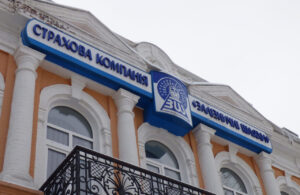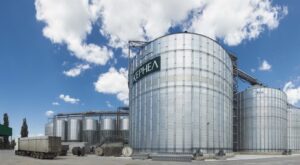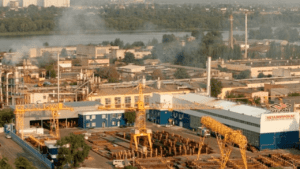
Arrival, an electric car startup founded in Great Britain by former deputy head of the Russian Ministry of Communications Denis Sverdlov, which is restructuring its business amid a set of problems, posted a $1 billion net loss in 2022, according to a company report.
Arrival’s fourth-quarter loss rose to nearly $600 million from $67 million in the same period in 2021, according to preliminary unaudited filings. The figure includes non-cash impairment charges and write-downs of more than $400 million. For all of 2022, the company estimates a loss of about $1 billion, compared with a loss of $1.3 million in 2021, which included a one-time non-cash charge of $1.2 billion related to the merger of Arrival and CIIG.
Adjusted negative EBITDA for the fourth quarter will be up to $172 million compared to $85 million in the same period of 2021. The company attributes the increase to about $70 million more in payroll and contractor costs and about $25 million more in component spending. Expected adjusted negative EBITDA for 2022 is about $380 million versus $203 million in 2021.
The company’s cash balance decreased by $126 million in the fourth quarter to $205 million by year-end. The money was used for working capital ($104 million), interest payments on loans and lease obligations ($11 million), capex expenses and other operating expenses.
Sverdlov (formerly head of operator Yota, and in 2012-2013, deputy minister of telecommunications of the Russian Federation. – Sverdlov (formerly the head of Yota, and Deputy Minister of Communications of the Russian Federation from 2012 to 2013) created Arrival in 2015. The startup raised funds from international investors and planned to roll out mass production of electric vehicles for large cities, proposing the concept of assembly in so-called “microfactories” as an alternative to conveyor car production.
In March 2021 Arrival went public on the Nasdaq exchange through a merger with SPAC. The company’s capitalization immediately after the IPO was valued at $13.6 billion, and Sverdlov, who controls 75% of Arrival through Kinetik Sarl, broke into the top 20 of Forbes Russia last spring. The magazine estimated his fortune as of April 2021 at $10.6 billion.
However, the full-scale war unleashed by Russia against Ukraine, as well as the adjustment of the company’s ambitious production plans, the rejection of the European market and the layoff of some employees led to the fact that the share price of Arrival by the end of November 2022 collapsed by almost 99% – from $22 when it was placed to just over $0.3. The price of the securities below $1 caused Arrival to receive a warning about possible delisting from Nasdaq back in early November. The exchange gave the startup six months, during which its shares must rise above $1 and stay there for at least 10 days in a row.
Amid the problems, Arrival announced plans to focus resources on developing US Van vans for the U.S. market. The company hopes to begin producing them in the U.S. city of Charlotte in 2024 “subject to raising additional capital.” “We will use $330 million in funds to achieve our U.S. goals and look to raise additional funds,” Sverdlov was quoted by Arrival’s press office as saying in a press release for its Q3 2022 reporting.
In early November, Arrival reported that the company may not have its first revenue until 2024, rather than 2023 as previously planned. The company reported a tenfold increase in net loss in Q3 (to $310.3 million) and a $330 million cash reserve, noting that the reserve would fund the business for the next 12 months.
Sverdlov stepped down as CEO of Arrival in late November 2022 to head the board of directors. By the end of January, Peter Cuneo, the company’s acting head, had already handed over the CEO position to Igor Torgov, the former head of telecom operator Skartel (Yota brand), who had previously worked with Sverdlov at Yota.
“After a detailed evaluation of Arrival and the electric car market over the past two months, the company’s management and board of directors have taken decisive action to make better use of current resources and optimize the business. These actions reaffirm our commitment to becoming a leader in innovative products and new, more efficient methods of producing vehicles, especially in the important U.S. commercial electric car market,” Arrival’s press office quoted Torgov as saying in a January announcement.
In the same announcement, the startup confirmed its intention to cut up to 800 people — about half of its staff — to optimize costs. “Combined with other real estate and third-party cost-cutting measures, the company expects to halve its current business spending, to about $30 million per quarter,” the press release said.

Net loss of insurance company “Zaliznychny Shlyahy” (Poltava) in 2022 increased by 14.2% up to UAH 13,571 mln, reported in materials for the agenda of shareholders meeting scheduled for April, 3.
It is also noted that assets of the company grew by 2.9% up to UAH 56.173 mln.
Equity capital decreased by 4.6% to UAH 36.6 million, cash and cash equivalents increased by 17.9% to UAH 19.8 million, current liabilities remained almost the same as a year before – UAH 5.921 million.
Accounts receivable have grown by 6,7% following the results of the year – up to UAH 2,748 mln.
The authorized capital of the insurer has remained at the level of UAH 21,3 mln.
IC “Zaliznychny Shlyahy” was registered in 1994, it specializes in providing services in the field of risk insurance.

Kernel, one of the largest Ukrainian agro-industrial groups, will not pay dividends for FY2022 (FY, July-2021-June-2022) due to the net loss of $41.1 mln incurred by the holding for the period.
According to the company’s announcement on the Warsaw Stock Exchange Tuesday night, the decision was made by the holding company’s shareholders at a meeting on Dec. 2022.
“Kernel Holding S.A. announces its annual general meeting of shareholders on Dec. 20, 2022, at which it declared a zero dividend for the fiscal year ended June 30, 2022,” the group said in a stock exchange statement.
“Kernel was the world’s number one producer of sunflower oil before the war (about 7% of world production) and its exports (about 12%), and was the largest producer and seller of bottled sunflower oil in Ukraine. In addition, the company was engaged in cultivation of other agricultural products and their realization.
The largest co-owner of Kernel, through Namsen Ltd. is Ukrainian businessman Andrei Verevskyi, with a 39.3% stake.
In FY2022 (July-2021 – June-2022), the holding posted net loss of $41 mln against $506 mln net profit in the previous FY. Its revenue decreased by 5% – to $5.332 bln, while EBITDA decreased 3.7 times – to $220 mln.

Avangard Agroholding LLC, parent company of Ukraine’s largest producer of poultry eggs, has reduced its net loss by 18.6 times in 2021 compared to 2020 to UAH 28.5 million.
According to the company’s report in the information disclosure system of the National Commission on Securities and Stock Market (NSCSM) on Monday, the company’s assets decreased last year by 19% to 20.71 billion UAH, while the unallocated loss decreased by 0.2% to 10.5 billion UAH.
According to the NKTSBFR, the net loss per common registered share of Avangard last year amounted to 0.00056 UAH.
According to the statement, on December 29, the annual shareholders’ meeting will be held on December 29, where shareholders are going to decide on offsetting the net loss incurred in 2021 at the expense of future profits.
As reported, Avangard said in March 2022 that it has incurred a loss of 1.5 billion hryvnias since the beginning of the Russian military invasion of Ukraine. Russian aggression led to the shutdown of a number of key poultry farms of the group, and chickens were left without food and died at the Chornobaivska poultry farm (Belozerska village, Kherson Region).
“Ukrlandfarming is one of the largest agricultural holdings in Eurasia. It grows crops, raises cattle, and distributes equipment, fertilizers and seeds. Its member Avangard is Ukraine’s largest producer of eggs and egg products.

Novovolynsk Foundry (Volyn Region) increased its net loss by 36% year-on-year in 2021 to UAH 25.3 mln from UAH 18.599 mln.
According to the company’s December 8 annual shareholders meeting announcement, its retained earnings by the end of last year amounted to 137.868 mln hryvnia.
The shareholders at the meeting intend to summarize the results of work in 2021, define plans for 2022 and elect a new composition of the supervisory board of the company.
It is suggested to pay off the loss for 2021 at the expense of profit of previous years.
As reported, the plant ended 2020 with a net loss of 18.539 million UAH, while in 2019 received a net profit of 35.877 million UAH.
The plant specializes in the production of high quality steel and iron castings for mechanical engineering.
According to the NDU for the fourth quarter of 2021, Dnister-M LLC (Lviv region) owns 84.6099% of Novovolynsk Casting Plant PJSC.
The authorized capital of the company is 1 million 568.06 thousand UAH, the par value of the share is 0.25 UAH.

PJSC “Ukrainian Mining and Metallurgical Company” (UMMC, Kyiv), one of the largest metal service companies in Ukraine, according to the results of work in 2021, reduced its net loss by 12.1 times compared to the previous year – to UAH 13.956 million from UAH 169.219 million.
As reported in the company’s announcement of holding the annual general meeting of shareholders remotely on December 1, its outstanding loss by the end of last year amounted to UAH 364.488 million.
Shareholders intend to make a decision to cover the loss at the expense of deferred profit.
The meeting also plans to approve major deals.
UMMC was established in 1998. It occupies a leading position among Ukrainian metal traders in sales of rolled metal products and pipes.
According to NDU data for the fourth quarter of 2021, Lanacomo Limited and Leadpoint Holding (both Cyprus) own 50% of UMMC shares.
The authorized capital of UMMC is UAH 22.028 million, the par value of a share is UAH 1.